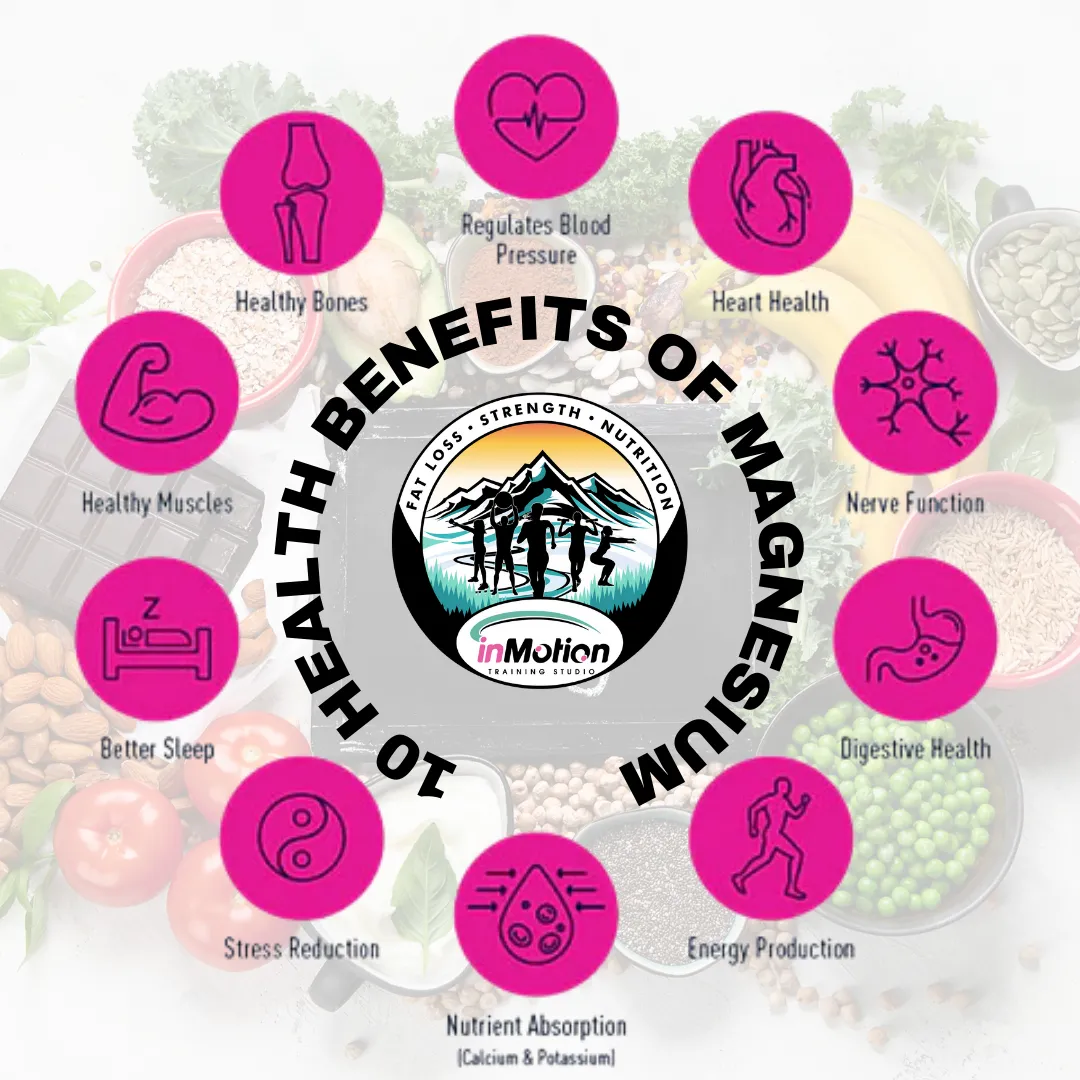blog | inmotion training studio

Magnesium is your Health Hero
10 Health Benefits of Magnesium
(plus best food sources)
Magnesium: The Unsung Hero of Your Health
Magnesium is a vital mineral that plays a crucial role in numerous bodily functions, supporting our overall health and well-being. In this article, we will explore what magnesium is, its dietary sources, how our bodies utilize it, and the importance of maintaining optimal magnesium levels for optimal health.
What is Magnesium and Why is it Important?
Magnesium is an essential mineral involved in over 300 enzymatic reactions in the body. It's necessary for various functions, including energy production, protein synthesis, and muscle and nerve function. Despite its importance, many people are unaware of the significant role magnesium plays in maintaining their health.
Ten Reasons Magnesium is Your Health Hero
Supporting Heart Health
Magnesium is crucial for heart health. It helps regulate heart rhythm, supports proper muscle function, and maintains healthy blood pressure levels. A deficiency in magnesium can lead to cardiovascular issues, including hypertension and arrhythmias.
Promoting Bone Strength
While calcium often gets the spotlight for bone health, magnesium is equally important. It works synergistically with calcium and vitamin D to build and maintain strong bones. Adequate magnesium levels can help prevent osteoporosis and fractures.
Aiding Muscle Relaxation
Magnesium plays a vital role in muscle function, including relaxation and contraction. It helps alleviate muscle cramps, spasms, and tension. This mineral is particularly beneficial for athletes and those who engage in regular physical activity.
Supporting Mental Health
Magnesium has a profound impact on mental health. It supports the production of neurotransmitters that regulate mood, such as serotonin. Adequate magnesium levels can help reduce symptoms of anxiety, depression, and improve overall mental well-being.
Enhancing Sleep Quality
Magnesium is known for its ability to enhance sleep quality. It helps regulate the production of melatonin, the hormone responsible for sleep-wake cycles. Additionally, it promotes relaxation and reduces stress, leading to better and more restful sleep.
Reducing Migraine Frequency
Studies have shown that magnesium can help reduce the frequency and severity of migraines. It helps relax blood vessels and has anti-inflammatory properties that can alleviate migraine symptoms.
Strengthening the Immune System
Magnesium plays a crucial role in maintaining a healthy immune system. It helps activate immune cells, supports the production of antibodies, and reduces inflammation, all of which are essential for fighting off infections.
Enhancing Mood
Magnesium supports brain function and helps regulate mood. By influencing neurotransmitter activity and reducing inflammation, magnesium can help alleviate symptoms of mood disorders and enhance overall emotional well-being.
Regulating Blood Sugar
Magnesium helps regulate blood sugar levels by improving insulin sensitivity. This is particularly beneficial for individuals with diabetes or those at risk of developing the condition. Maintaining optimal magnesium levels can help prevent blood sugar spikes and crashes.
Reducing Inflammation
Chronic inflammation is linked to numerous health issues, including heart disease and autoimmune disorders. Magnesium helps reduce inflammation by inhibiting the release of pro-inflammatory cytokines, promoting overall health and reducing the risk of chronic diseases.
Dietary Sources of Magnesium
Incorporating magnesium-rich foods into your diet is essential for maintaining optimal levels. Some excellent sources of magnesium include:
Leafy Greens: Spinach, kale, and Swiss chard.
Nuts and Seeds: Almonds, cashews, pumpkin seeds, and sunflower seeds.
Whole Grains: Brown rice, quinoa, and oats.
Legumes: Black beans, chickpeas, and lentils.
Fish: Salmon, mackerel, and halibut.
Fruits: Avocados, bananas, and figs.
Dark Chocolate: Contains a significant amount of magnesium and is a delicious way to boost your intake.
See Chart below
Addressing Magnesium Deficiency
Magnesium deficiency is more common than you might think. Symptoms of deficiency can include muscle cramps, fatigue, irritability, and irregular heartbeats. Ensuring you get enough magnesium through your diet is essential, but sometimes supplements may be necessary, especially for those with higher needs or absorption issues.
The Role of Magnesium Supplements
For those who struggle to meet their magnesium needs through diet alone, supplements can be a helpful option. Magnesium supplements come in various forms, including magnesium citrate, magnesium oxide, and magnesium glycinate. It's important to consult with a healthcare professional to determine the best form and dosage for your individual needs.
Understanding Magnesium Supplements
Magnesium supplements serve a specific purpose in meeting the recommended daily intake of magnesium. While a balanced diet is the ideal way to obtain nutrients, supplements may be necessary in certain situations. Factors such as magnesium deficiency, low dietary intake, specific health conditions, or lifestyle factors can contribute to the need for supplementation. Magnesium supplements can help support overall health and wellbeing, including promoting bone strength, aiding muscle relaxation, supporting heart health, and contributing to mental wellness.
Magnesium supplements are available in various forms, each with its own characteristics and benefits. These include capsules, tablets, powders, and liquids. The choice of form depends on personal preference, ease of ingestion, and any specific requirements or sensitivities.
There are several types of magnesium supplements, each offering unique properties and potential benefits. Here are some commonly used types:
Magnesium Glycinate: Known for its high bioavailability and gentle effects on the digestive system, magnesium glycinate is often favoured for its calming properties and potential support for relaxation and sleep.
Magnesium Bisglycinate: Similar to magnesium glycinate, magnesium bisglycinate is a highly bioavailable form of magnesium known for its easy absorption and minimal gastrointestinal discomfort.
Magnesium Citrate: Recognized for its efficient absorption, magnesium citrate is commonly used to support regular bowel movements and digestive health.
Magnesium Malate: This form of magnesium is often preferred for its potential benefits in promoting energy production, supporting muscle health, and alleviating muscle discomfort.
Magnesium L-Threonate: Known for its potential cognitive benefits, magnesium L-Threonate is believed to have a unique ability to cross the blood-brain barrier, potentially enhancing brain function and memory.
Magnesium Chloride: Often used topically in the form of lotions or oils, magnesium chloride may be applied directly to the skin for localized absorption, offering potential benefits for muscle relaxation and skin health.
Magnesium Combined with Calcium and Zinc: Some magnesium supplements are formulated with calcium and zinc, which work synergistically to support bone health and overall mineral balance in the body.
These different types of magnesium supplements provide individuals with options based on their specific needs and preferences. It's important to consult with a healthcare professional or registered dietitian to determine the most suitable type and dosage of magnesium supplement for your individual circumstances.
Here is my link to my fullscript account where you can get 20% off any supplement
Conclusion
Magnesium is an unsung hero in the world of essential minerals. Its impact on heart health, bone strength, muscle function, mental health, and sleep quality makes it a vital component of overall well-being. By incorporating magnesium-rich foods into your diet and considering supplements if necessary, you can ensure you're reaping the numerous benefits this mighty mineral has to offer.
Embrace magnesium as your health hero and unlock a path to improved health and vitality.
I crafted this blog post to be informative and engaging, focusing on the importance of magnesium and its numerous health benefits. If you have any specific details or personal touches you'd like to add, please let me know!

In motion training studio - bend
social media
REQUEST MORE INFORMATION
change you can do & results you will see








